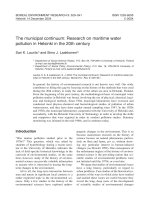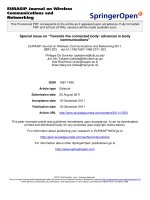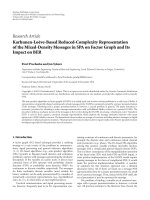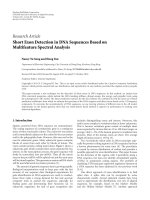Research on simulating the short circuit faults in dc traction network of Hanoi pilot light Metro line Nhon – Hanoi railway station
Bạn đang xem bản rút gọn của tài liệu. Xem và tải ngay bản đầy đủ của tài liệu tại đây (601.57 KB, 9 trang )
RESEARCH ON SIMULATING THE SHORT CIRCUIT FAULTS IN DC
TRACTION NETWORK OF HANOI PILOT LIGHT METRO LINE
NHON – HANOI RAILWAY STATION
DANG VIET PHUC, NGUYEN THANH HAI, AN THI HOAI THU ANH
University of Transport and Communications, No 3 Cau Giay Street, Hanoi, Vietnam
Corresponding author’s email:
Abstract: Faults of the traction power supply system, especially short circuit faults, have
adverse effects on reliability and safety in operating urban electrified trains. Therefore, in this
paper, the modeling of the traction power supply system of Hanoi pilot light metro line Nhon –
Hanoi railway station, Vietnam has been studied with short circuit faults in variations of
starting-up process and short circuit conditions. Simulation results of characteristics of current
under motoring mode and short circuit in traction power supply system conducted on Matlab
/Simulink software play a key role in selecting components and setting up protection relays
correctly with the aim to enhance the reliability of traction power system to operate electrified
trains in safety.
Keywords: Traction power supply system, short circuit fault, remote short circuit current,
feeder protection, fault analysis.
Received: 05/05/2020
Accepted: 19/05/2020
Published online: 14/06/2020
I. INTRODUCTION
With its outstanding advantages such as high capacity, reliability, punctuality, reduction in
emissions, urban railway sector, one of the most important parts of a transportation system,
contributes meaningfully to the economic growth of each nation as well as greenest means of
transportation to decrease CO2 emissions in the environment.
In Vietnam, many metro lines in Ho Chi Minh and Hanoi cities are under construction,
among of which, Hanoi pilot light metro line Nhon – Hanoi railway station is going to exploit in
2021. The traction power supply system of this metro line operates at 750 V DC supplied from
medium power grid 22 kV AC. To ensure safety and reliability in operation, analyzing short
circuit faults of DC traction power supply system is a crucial issue of whole metro line Nhon –
Hanoi railway station. Short circuit can arise from defective trains or traction motors [7, 8], or
from metallic contact between the third rail and the traction current return path [8, 11, 12]. The
short circuit faults pose a potential threat to safety as well as cause considerable damage to
equipment in the traction power supply system. Therefore, research on the traction power supply
system performance of Hanoi pilot light metro line Nhon – Hanoi railway station during short
INTERNATIONAL COOPERATION ISSUE OF TRANSPORTATION - Especial Issue - No. 10
73
circuit fault condition has significant importance from the system security and reliability points
of view.
In the world, the technologies of the urban railway transit have developed early, meanwhile
these ones are very new in Vietnam. In recent years, numerous works involved in the urban
railway traction power supply system have been published and implemented on railway transit
systems worldwide. Authors in [1] provided technologies of the urban railway power supply
system. In [2], a model for traction system has been proposed to discuss the influence of DC
traction system on power grid harmonics. In [3, 4], the research has been done with the evaluation
of the impacts of harmonic traction current on the automatic train control systems. Authors in [13]
proposed the six - pulse three phase rectifier bridge model for calculating close-up and remote
short circuit transients on DC supplied railway and used piecewise linear techniques for modelling
both close-up and remote faults, then compared with practically measured results. In [14], an
accurate simplified calculation method based on second-order approximation to accurately
determine the current waveform for remote and close-up short circuit faults currents on DC
traction supply system were presented. Authors in [15] analyzed the model of the
transformer/rectifier, utilized Kron's tensor analysis to reformulate circuit equations automatically
after switching operation, and evaluated the impacts of the ratio DC side resistance to AC side
inductance and the ratio DC side inductance to AC side inductance on the short circuit transient.
However, in the above analyzed studies, the short circuit faults in the comprehensive traction
power supply system have not been considered.
This paper conducts the research on short circuit faults in the traction network of Hanoi
pilot light metro line Nhon – Hanoi railway station. The model of traction power supply system
with 12-pulse rectifier units is simulated on software Matlab/Simulink. The objective of the model
is to study the short circuit faults and the train starting current in the traction network.
II. MAIN CONTENTS
1. DC traction power supply system configuration
A typical section of traction power supply system of Hanoi pilot light metro line Nhon –
Hanoi railway station is shown in figure 1. The traction power supply system is the complex
system that is divided into power source (PS-1, PS-2), traction substations (TRSS-1, TRSS-2),
traction network, and train. The medium voltage level of 22 kV AC is converted to a lower voltage
one through the three-winding transformer (TRSS) in each substation and with the aid of rectifier
(TR), and thus the DC traction voltage is generated and connected to the substation positive and
negative bus bars. The 12-pulse rectifier unit supplies power at 750 V DC through the third rail
to the train [2].
Each traction substation has two sets of 12-pulse rectifier units. The traction transformer
has a delta-connected (∆) primary winding, with dual star (Y) and delta-connected (∆) secondary
windings providing equally secondary line voltages 585 V, and line voltage phase angle of deltaconnected secondary winding lags that of star-connected secondary winding by 30o.
74
INTERNATIONAL COOPERATION ISSUSE OF TRANSPORTATION - Especial Issue - No.10
The train consists of 3 motorized cars and one trailer car. On each motorized car, there are
four induction motors in parallel fed by a voltage source inverter. traction electric motor
parameters use for simulation purposes: 200 kW, 585 V (phase to phase), 3 phases, 4 poles and
81.3 Hz, 2400 rpm rated speed [2].
Figure 1. Typical section of traction power supply system
2. Simulation model of traction power supply system
The simulation model of traction power supply section of Hanoi pilot light metro line Nhon
– Hanoi railway station is performed on Matlab/Simulink simulation platform in figure 2. This
simulation model corresponds to schematic diagram (figure 1) and includes two power sources of
external network (PS-1 and PS-2), two traction substations (TRSS1 and TRSS2), track feeder
(RL-f1, RL-f2), return current lines (RL-r1, RL-r2), section of traction network (Net-1 and Net2) and electric rolling stock consisting of three carriages (car 1-car 3), short circuit fault model
and monitoring and measuring performance system.
Sources PS-1 and PS-2 are external power supply modules, whose voltage levels are 22 kV
AC. A three-phase AC 50 Hz source plus some small impedances is included in the equivalent
external power system.
At traction substations with 12-pulse rectifier conversion of three phase AC with voltage
of 22 kV AC is carried out, resulting from the primary power supply system of the electric city in
DC with nominal voltage on bus bar of traction substation 825 V. Traction substation consists of
traction transformers and rectifier units. To calculate the parameters of traction transformer, the
formulas were used given in [5]. In the each traction substations 12-pulse rectifier is modelled as
INTERNATIONAL COOPERATION ISSUE OF TRANSPORTATION - Especial Issue - No. 10
75
the substation rectifier in actual system and supplies power at 750 V DC through the third rail to
the train. The diode in the rectifier is modelled with 0.01 Ω as the on-state resistance and 106 Ω
as the off-state resistance.
Figure 2. The simulation model of traction power supply system
Traction network of power supply system comprising of contact rail and track circuits is a
line with distributed parameters. The total length of traction network is assumed to be 1957 m.
Traction network section is implemented to simulate the equivalent resistance and inductance of
the third contact rail and the running rails [3, 9, 10, 11 and 12]. The circuit model of traction
network section is shown in figure 3.
Figure 3. Circuit model of traction network
The model of train consists of 3 carriages models (Car-1, Car-2 and Car-3), each of which
has a traction drive with asynchronous motors. Model of the main scheme of power circuit of
electric equipment of traction drive of each carriage includes a LC-filter, a voltage source inverter
with the pulse width modulation (PWM) generator. Traction inverter with PWM converts DC
voltage are taken from the contact rail into three-phase voltage with variable voltage and variable
frequency (VVVF) to supply four parallel asynchronous traction motors. Switching frequency of
PWM inverter in traction mode of rolling stock is 2400 Hz.
76
INTERNATIONAL COOPERATION ISSUSE OF TRANSPORTATION - Especial Issue - No.10
Figure 4. The simulation model of AC motor drive system
A circuit branch consists of an ideal switch block and a small impedance block stands for
the short circuit fault. The fault impedance used in the simulation model is purely resistive. The
block “step” is to count the time and gives the trigger signal to the switch to let the fault “happen”.
Figure 5. Short circuit fault model
3. Simulation results analysis
The traction power supply system of Hanoi pilot light metro line Nhon – Hanoi railway
station has been modeled and simulated on Matlab/Simulink. Simulation results are obtained for
the starting-up process and short circuit conditions, which include traction current profiles
observed from the traction substation. The 23tb ode with variable simulation steps is chosen as
the simulation method.
When the train is being started from 0 to 50 km/h, feeder line currents at each substation
are given in figure 6. The maximum starting current of feeder line of traction substation TRSS1
can reach about 1650 A. Both the starting-up currents depend on the train location when the
starting–up occurs. As shown in figure 6, both the current rising rate and current increment
decrease when the distance from traction substation is increased.
INTERNATIONAL COOPERATION ISSUE OF TRANSPORTATION - Especial Issue - No. 10
77
Nearby substation TRSS 1
Remote substation TRSS 1
Figure 6. Train starting of different feeder lines on traction power supply section
Near short circuit current
Remote short circuit current
Figure 7. Short circuit current profile of near and remote away from TRSS 1 with the train
The most common type of faults in traction power supply system is the short circuit
between contact rail and running rail [7, 8 and 9]. Short circuit fault of track feeder to rail consists
of near and remote short circuit faults. The distances are 0.1 km and 1,857 km respectively under
the condition that the distance between two traction substations is 1,957 km. In both cases, the
fault resistance is 100 m [10]. Traction current profiles of external faults occurring near and
remote the traction substation are given in figure 7 and 8. Figure 7 presents the short circuit current
profiles with the train running at 50 km/h. When the short circuit fault occurs at location of 0.1
km along the track, the impulse current with large amplitude can be generated rapidly. The
maximum short circuit current can reach about 7.06 kA. With the increasing of the distance from
the fault location to the traction substation, the value of the short circuit current will be reduced
to 1520 A, so as to the current rise rate. Figure 8 illustrates that when the short circuit fault occurs
78
INTERNATIONAL COOPERATION ISSUSE OF TRANSPORTATION - Especial Issue - No.10
at location of 0.1 km along the track without train, the maximum short circuit current can reach
about 6.3 kA while the remote short circuit current is 1300 A.
a)
b)
Figure 8. Short circuit current profile of near and remote away from TRSS 1 without the train
Comparing the simulation results of train starting current in figure 6 with short-circuit
current in figure 7 and 8, it is found out that depending on the train location, the increment and
rising rate of the short circuit current can be smaller than those of the starting current of the train
owing to the high series impedance of the traction supply.
III. CONCLUSIONS
To study the short circuit faults in traction power supply system of Hanoi pilot light metro
line Nhon – Hanoi railway station, a comprehensive model of traction power supply system and
the short circuit fault model of the system have been presented in this paper. Simulation studies
were conducted with respect to variations of the starting-up process and short circuit conditions.
The short circuit current depends on the fault location. Close-up faults result in short circuit
current with high magnitudes and high rising rate of current. Thus these defects can be quickly
INTERNATIONAL COOPERATION ISSUE OF TRANSPORTATION - Especial Issue - No. 10
79
and properly detected. Remote short circuit fault currents are no more than train starting currents.
It is pointed out that the phenomena of mis-operation and mal-operation cannot avoid with
traditional protection without protection of the whole feeder line. Therefore, it is important to
choose the main protection elements that could discriminate the short circuit current from the train
starting currents.
According to the simulation results of short circuit current, short circuit fault may cause
accidents, and threaten the safe operation of electrical equipment as well as the personal security
of operating personnel. Therefore, choosing protection scheme and the principle of setting
protection relay for the traction system supply in the technical design of Hanoi pilot light metro
line Nhon – Hanoi railway station is very important.
Acknowledgment
This work is funded by University of Transport and Communications (UTC) under the
project code T2020-DT-002.
References
[1]. Le Manh Viet, Nguyen Tuan Phuong, Research on the technology of high speed railway and urban
railway power supply system, Transport and communications Science journal, 28 (2008) 46-50.
[2]. Dang Viet Phuc, Nguyen Thanh Hai, Research on the influence of urban railway traction power supply
system on power grid harmonics, Transport and communications Science journal, 65 (2018) 3-10.
[3]. Dang Viet Phuc, Nguyen Thanh Hai, Shevliugin Maxim Valerievich, Evaluation of the influence of
harmonic traction current in the metro power supply system on the signaling and automatic train control
systems ATO-ATP, Journal Measurement, control and automation, No 20 (12/2017) 60-66.
[4]. Shevliugin Maxim Valerievich, Dang Viet Phuc, Harmonic interference of traction current in metro
power supply system, World of transport and transportation, Russia, Vol.13 (2015) 88-101.
[5]. I.V. Chernykh, Modeling of electrical devices in Matlab, SimPowerSystems and Simulink, Moscow,
2008.
[6]. Li, M.X., He, J.H., Bo, Z.Q., Yip, H.T., Yu, L., Klimek, A., Simulation and Algorithm Development of
Protection Scheme in DC Traction System, PowerTech in Bucharest, Romania, July, 2009.
[7]. J Hu, J H He, L Yu, M X Li, Z Q Bo, F Du, J F Xu, The research of DC traction power supply system
and the DDL protection algorithm based on Matlab/Simulink, International Conference on Electricity
Distribution, China 2010.
[8]. Zihui Hao, Mingli Wu, Jingjing Ye, Fault modelling and protection research of multi-vehicle DC
traction power supply system, 2019 IEEE 3rd Advanced information Management, Communicates,
Electronic and Automation control conference (IMCEC 2019), 2019.
80
INTERNATIONAL COOPERATION ISSUSE OF TRANSPORTATION - Especial Issue - No.10
[9]. F Du, J H He, L Yu, M X Li, Z Q Bo, A Klimek, Modeling and simulation of metro DC traction system
with different motor driven trains, Power and Energy Engineering Conference (APPEEC), Asia Pacific,
2010.
[10]. CS. Chang, A. Khambadkone, Zhao Xu, Modeling and Simulation of DC Transit system with VSI-fed
induction motor driven train using PSB/MATLAB, IEEE PEDS 2001 INDONESIA (2001) 881-885.
[11]. M. Fracchia, R.J. Hill, P. Pozzobon, G. Sciutto, Accurate track modeling for fault current studies on
third-rail metro railways, Railroad Conference, 1994, Proceedings of the 1994 ASMWIEEE Joint (in
conjunction with Area 1994 Annual Technical Conference), 1994, 97-102.
[12]. Sy Ruen Huang, Yueh Lung Kuo, Bing Nan Chen, A short circuit current study for the power supply
system of Taiwan Railway, IEEE Transactions on power delivery, vol. 16, No 4, October 2001, 492-497.
[13]. J.C. Brown, J.Allan, B. Mellitt, Six-pulse three-phase rectifier bridge models for calculating close-up
and remote short-circuit transients on DC supplied railways, IEEE proceedings B - Electric Power
Applications, November 1991.
[14]. C.L. Pires, S.I. Nabeta, J.R. Cardoso, Second-order model for remote and close-up short-circuit faults
currents on DC traction supply, IET Power Electronics, vol.1, No 3, 2008, 348 – 355.
[15]. Kongwei, Qinlijun, Yangqixun, Dingfuhua, DC side short circuit transient simulation of DC traction
power supply system, International conference on power system technology, Singapore, November 2004.
INTERNATIONAL COOPERATION ISSUE OF TRANSPORTATION - Especial Issue - No. 10
81









